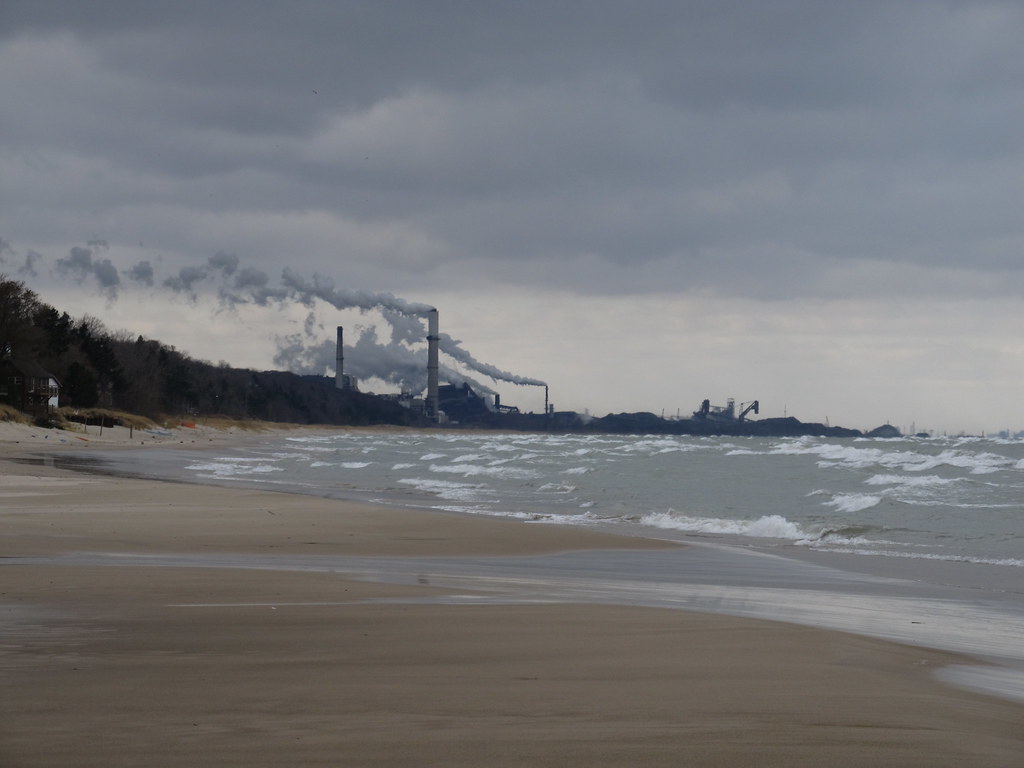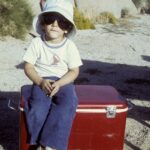From our place in Iowa, the way to the Dunes goes through Chicago. The Dunes are big old hills of sand on the southern shore of Lake Michigan, staked down by beachgrass and swamp oak. Chicago, of course, is a city on the same shore. It is big, and it is old enough, by American lights, to inspire poetry: “Come and show me another city with lifted head singing so proud to be alive and coarse and strong and cunning,” said Sandberg.
But he said that a hundred years ago. Does anyone sing on I-80 these days? Come and show me another road so desolate! Watch the road, look at the billboards. Have you been personally injured? “Call in the sharks.” Are you a gentleman? There’s a club for you (“unlicensed therapists on duty”). Think you might be going to hell? “Jesus saves.” And here’s your exit, thank the Lord Who is merciful. But now you’re in Gary.
From the Dunes you can look west down the shore and see the old steel mill, sitting on the beach, still puffing smoke, a ruin in the fog. My son wanted to go check it out. I told him it was like a mountain on the horizon, that it only seemed reachable because it was so huge. He didn’t believe me, but he was busy fighting waves, so he let it go.
Rich people have houses on the water, but we camped out in the woods. This is all National Park, or State Park, where non-rich people have options. We got a walk-in site, and of course the place to walk in was under construction, so there was some extra walking. Shall I compare it to a summer’s day? It was less lovely and less temperate, and rough winds shook the tent all night, while our boys slept the darling sleep of those who are old enough to have adventures but too young to pack up in the morning.
Poor people, of course, do not camp. Maybe not camping makes them feel like rich people. In Gary we saw them, the poor people, slouching toward McDonald’s. And there were more billboards. “Re-imagine Re-building,” said the mayor, who was up for Re-election. I wanted them to imagine the woods instead. It was a fairy village, a midsummer night’s dream, a rabbit warren from a children’s book, with soft dirt paths winding from and around one site to another, up and down little hills, dark at night under the trees but twinkling with lanterns and the quiet fires of neighbors, not too close and not too far. Kids on bikes. Sleepy dads. Lightning bugs.
The boys didn’t want to leave. I told them we had to leave sometime, that we couldn’t just live here. “Why not?” they wondered, sincerely. Well, it’s not our woods, for one thing. We don’t own it. We’ve got to leave so other people who also don’t own it can have a turn. Also, there are twenty mosquito bites on each of my ankles (I counted), and mom is pregnant, I don’t even know how she camped this long. So. (“So what?” they wondered, sincerely.)
No, boys we need to be home, and this isn’t home. This is just an adventure.
Back on I-80, suffering the slings and arrows of outrageous commerce (“I’m lovin’ it”), I kept telling the boys that if they looked north out the window they might see the skyscrapers. But downtown was too far away. So they never saw the real city, the big shiny broad shoulders of the Sears Tower, the airports that sent me on many a boyish adventure and brought me back home again. That will be for another day.
After the city receded, and I could think again, I thought more about the woods, and how the kids wanted to stay. Why not, exactly? What if we sold our house, got rid of our stuff, lived on the cheap, camping here and there and everywhere? Isn’t that the simple life we say we want? We can’t, because we’re soft; but maybe we’re soft because we don’t. And maybe that’s the point; people aren’t meant to be soft. If we can’t be at home in the woods, if we can only have adventures in the woods, it’s because we’ve spent too long making our home in a house. But if we could feel at home there, we’d feel more at home than we do in our houses. We’d feel more human, more like ourselves. Wild and free.
And then I thought: no. Play it out in your mind. What would you do, if you went to the woods not to camp for a few nights, but to live deliberately, to make yourself at home? Well, you’d start out like a camper. Then you’d encounter some problems, and you’d solve those. You’d put in a trench to keep the rain away. You’d find a big rock and set it up at the entrance, just to say “this is us” and “welcome.” You’d develop your ways and means, your habits and routines, your systems and your structures. By and by, your camp would start to look something like . . . a house. And in the making of it, in making it both practical and beautiful, you’d have made a home. Because that is what humans do. In fact it’s what all animals do; foxes dig holes, birds build nests.
The woods, then, the woods unchanged and unadorned, cannot be our home, even if it can be an adventure. The romance of the “return to nature,” if it is not a return to human nature, is a bad path. At the end of it, we find no place to lay our heads. We find something coarse and strong and cunning—at first. There’s pride in it at first, pride in our ability to live without a home, to suffer and endure the stings. We lift up our head singing about ourselves, and it seems like we’ve found the way to live. Wild and free. But then, desolate.
The city we saw was no place like home, either. That’s what I thought as we left it behind and headed back to Iowa: there’s a place that’s not fit for human habitation. I’d rather live in the woods than on the streets of Gary, because those streets are more of a wilderness than any woods could ever be. But either way, a wilderness is for adventuring. Not for living.
It’s not that you can’t live in the wilderness. No: it’s that if you start living in the wilderness, whether it’s the city or the woods, it stops being wilderness and becomes something else, something human. And thus the horror, the horror: to come to a place full of people that feels empty as a desert. Water, water everywhere, not a drop to drink. Living souls living there, but nobody’s home. Or so it seems, to an outsider. But maybe I don’t know what to look for.
For us, just passing through, I-80 was another adventure. Even the billboards were interesting. But who can live, really live, in their shadow? Who can feel at home in that noise? I think some people can, actually. I think there are big-shouldered people who can build good homes in bad places. Still the question is, what’s a good place? A place good for people?
It’s not I-80, that’s for sure. I-80 is only good for cars and lawyers (and gentlemen). But it’s not the woods, either. (Twenty mosquito bites. Each ankle. And do you think they only had eyes for my ankles?) What then—the suburbs? The small town? The downtown? The old world village? The bedouin camp? The cloister? The ivory tower? Bentonville, Arkansas?
I don’t know. I think it’s fun to have some models in mind. But utopia isn’t home, either. You can’t actually get to utopia; it only seems like you can because it looms so large. I think it’s better to start wherever you are, and ask what it needs you to do. Dig more trenches to keep the rainwater away? Add another rock to the cairn at the gate? Fewer billboards? More bug zappers?
For what it’s worth, I think that these days there’s usually more homemaking to be done by taking things out than by adding things in. There’s a lot of ground to clear. Homemaking for most of us will be a matter or less, not more. Maybe start with that Postman Pledge.






4 comments
Martin
Nice reflections derived from direct experience. I liked this part about utopia:
“I think it’s better to start wherever you are, and ask what it needs you to do.”
Reminded me of Kim Stanley Robinson’s book “Pacific Edge” that concludes his Three Californias trilogy of future visions. Unlike most utopias, KSR actively tries to imagine how we would get from here to there, with a paragraph or so at the start of each chapter detailing the process that led to the book’s initial setting.
and this:
“It was a fairy village, a midsummer night’s dream, a rabbit warren from a children’s book, with soft dirt paths winding from and around one site to another, up and down little hills, dark at night under the trees but twinkling with lanterns and the quiet fires of neighbors, not too close and not too far. Kids on bikes. Sleepy dads. Lightning bugs.”
This poetic passage reminded me of a book of my own childhood, title long forgotten. It had drawings of penguins (“tuxedo birds” they were sometimes called back then) strolling in NYC’s Central Park with evening humidity making haloes around the lights atop elegant posts. I still think to myself “the penguins are out” when I experience that kind of calm during an evening in a park…anywhere.
As for vacation versus “really” living in the wilderness: there’s always a watershed time period that shows you the initial wave of difficulty. Perhaps it’s when you have to start doing laundry, or some other task to make you feel at ease. A few nights won’t do it, probably need a week or more, depending on your family’s habits.
Kevin Hadley
Love the line about the horror of a place full of people that is as empty as a desert.
I recommend the Theopolis.org stuff. They talk about how man is created to take a untamed wildernesses and turn them into garden cities. The nastiness of the modern city–a la Cain–is a satanic distortion of God’s true purpose for man. The New Jerusalem is: a city.
Dan Grubbs
I’m working on a piece about why cities are not God’s intended place for His people to live. Yes, we can make our lives exist nearly anywhere, but there are places where we are devinly intended to live and I believe that is decidedly NOT in cities, or what I now think of as the places of Cain. More to come on this line of thinking.
Max
I would argue that cities and towns are part of God’s intended plan. I am not thinking of American cities, but human scale cities where you can walk to church, the grocery store, a relative’s house – where community and fellowship thrive. God’s vision for humanity in the end is the New Jerusalem, a city.
Comments are closed.